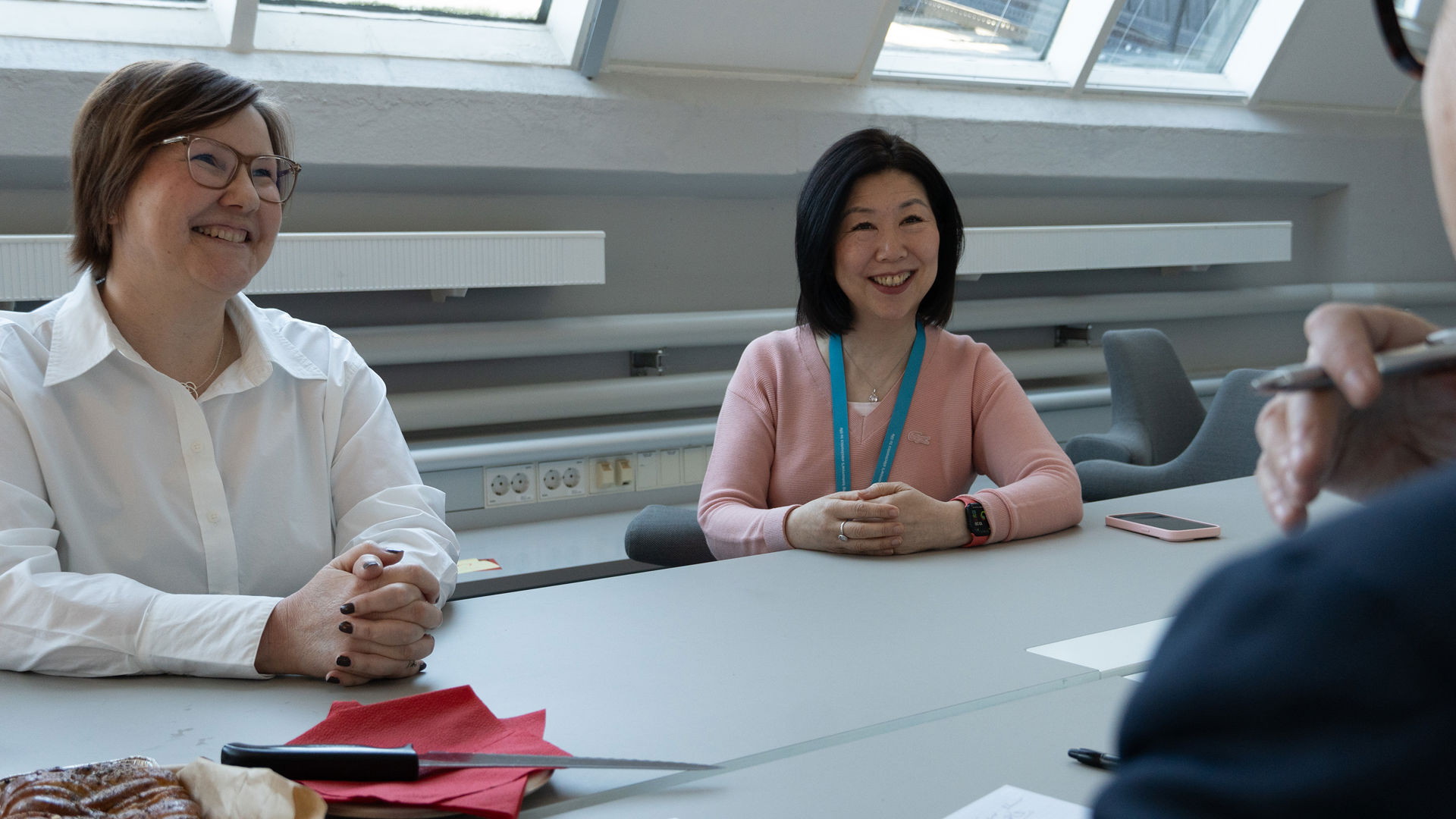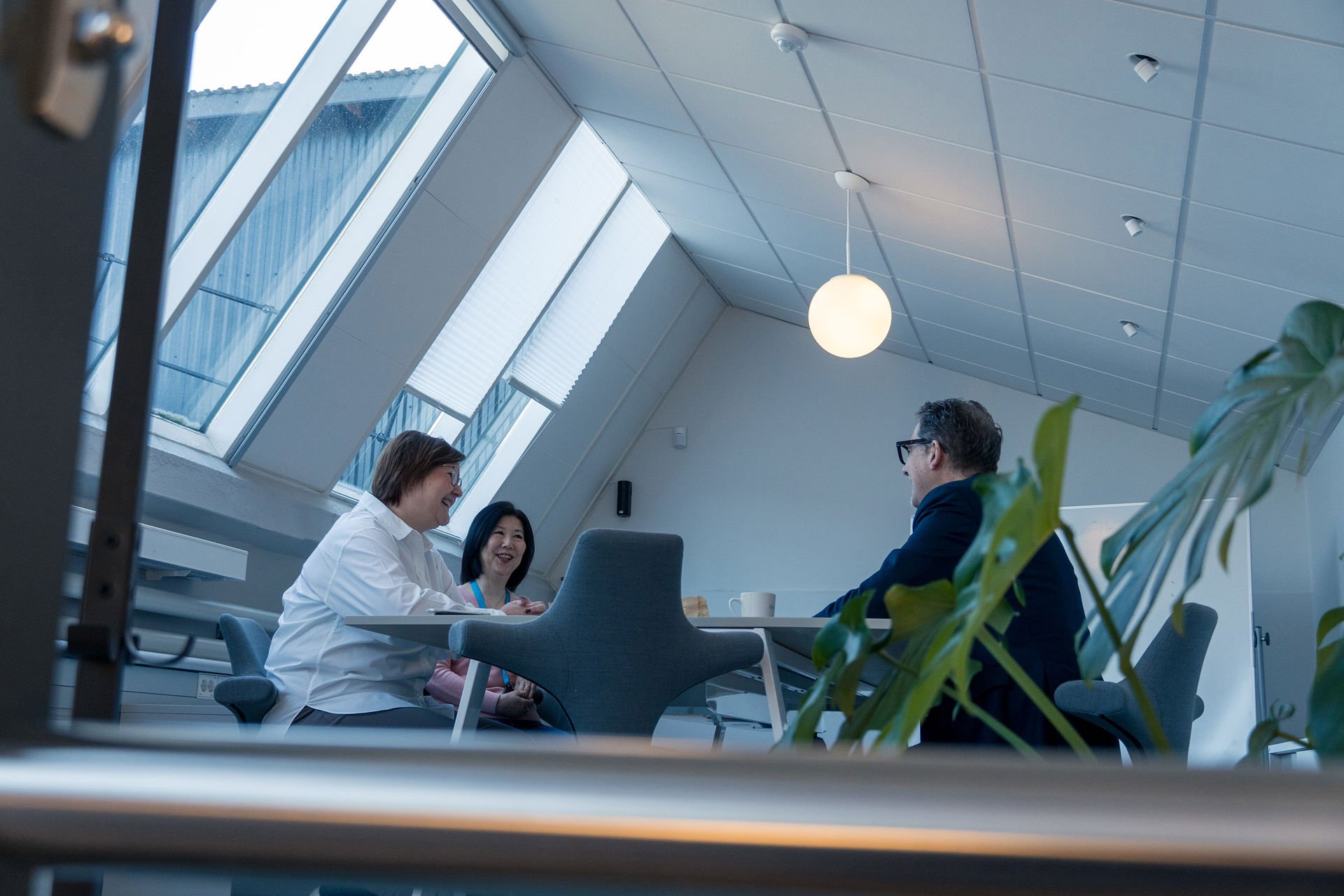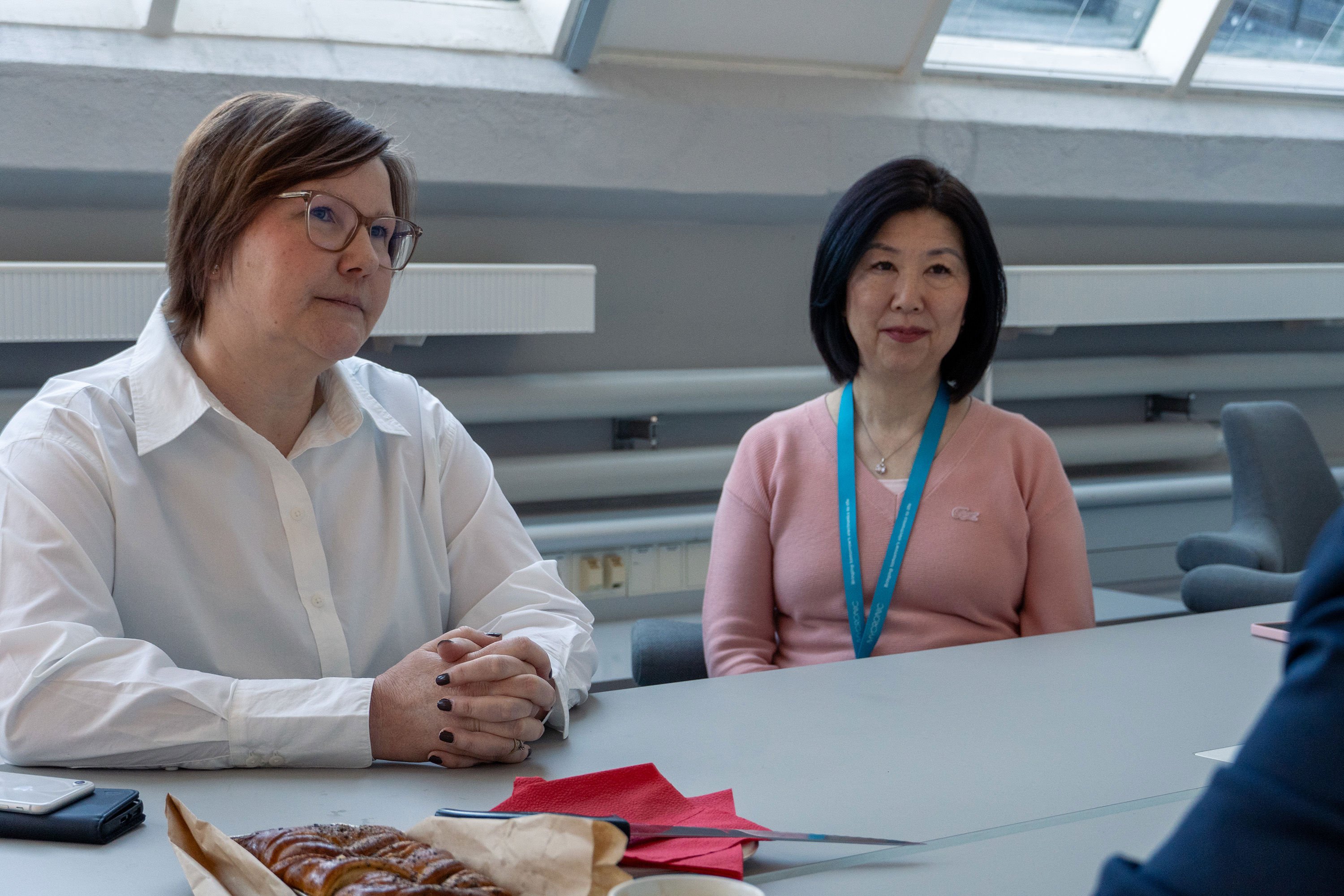Anything is possible
How two Mycronic R&D leaders are defying stereotypes and aiming for the starsHunched over the instrument panel of a Saab fighter jet, Jenny Svahn learned early in her career what “Zero Defects” truly means. In the high-stakes world of aviation software, there’s no room for error – only flawless data and fast programming. Today, as Group Manager for High Performance Computing at Mycronic, Jenny channels that same intensity and precision to building systems that power the future of electronics manufacturing.

From China to USA to Sweden
Alongside her is Hongyan Tu, a longtime colleague and close friend who leads cross-functional software teams in Mycronic's PCB Assembly Solutions division. Born in southern China and raised in Beijing by engineer parents, Hongyan was immersed in technology early – building transistor radio kits for fun, learning old-fashioned soldering with a traditional iron, and experimenting with the simplest circuit designs on a small PCB. Her career spans continents, from Zhejiang University and Arizona State University to Stockholm, where she now lives.
Empowering women in tech
Together, Jenny and Hongyan are inspiring examples of how Mycronic is attracting and empowering women in tech – developing diverse talents and perspectives with a hands-on, “no fuss, let’s get it done” mindset. Still, neither wants to be boxed in by gender-based expectations. "There are so many stereotypes of women in R&D,” says Hongyan. "I just want to lead great projects and make an impact. Innovation doesn't have a gender, it has a mindset.”

“Innovation doesn’t have a gender, it has a mindset.”
Hongyan Tu, Project Manager & Team Leader, PCB Assembly Solutions
Jenny Svahn grew up in Västerås, a mid-sized Swedish city about 100 kilometers (62 miles) west of Stockholm, known for its industrial heritage and scenic lakeside setting. The city has long been an engineering hub, historically home to companies like ABB.
Making sense of the world
From an early age, she was drawn to science, always curious about how the natural world worked. With a strong aptitude for mathematics and logical thinking, she pursued a degree in Electrical Engineering at Mälardalens Högskola (now Mälardalens University). After graduating, she joined a software consultancy, where she worked on the Saab Gripen multirole fighter aircraft.
She learned software later
“It might be hard to believe, but I hadn’t really been properly exposed to software development until around 2000,” says Jenny Svahn, offering encouragement to other women interested in R&D – especially those who may not have studied a specific discipline but can still build on their education and experience “as a baseline to pursue other areas as well.” After five years of commuting from Västerås to Linköping, she and her husband enrolled in Java courses at KTH Royal School of Technology and relocated to Täby, a Stockholm suburb and home to Mycronic’s headquarters.
See the impact directly
“What I loved about working on the JAS Gripen cockpit display was the mix of software and hardware – and how, as part of a close-knit interdisciplinary team, you could immediately see the impact of your work,” says Jenny. “It’s much like what we do at Mycronic with our laser writers and PCB assembly machines – everything must run seamlessly.”
“Everything must run seamlessly.”
Jenny Svahn, Group Manager for High Performance Computing, Pattern Generators Division

Jenny & Hongyan’s best advice for women in R&D and engineering
- Don’t worry too much about what others think – Confidence grows when you stop giving power to outside opinions.
- Say yes to new challenges – Growth comes from stepping outside your comfort zone.
- Focus on your strengths, not gender differences – Build on your capabilities and track your progress.
- Be self-aware – Notice how your skills are evolving. Self-awareness is a career superpower.
- Make your goals known – Let your manager know where you want to grow next.
- Don’t assume others know more than you – Speak up, ask questions, and own your expertise.
- Build a support network – Seek mentors, allies, and peers who back your ambitions.
- Keep learning – Technical and soft skills alike open doors.
- Challenge stereotypes by being authentically you – Be technical, nurturing, bold – whatever feels true.
Cultivating strong people skills
At Mycronic R&D is not centralized but divided across four decentralized divisions, each tailored to specific products and customer needs. Over her 20-year career, Jenny split her time evenly between the Pattern Generator division – developing laser writer equipment for displays and microchips – and PCB Assembly Solutions division, which focuses on automated assembly for high-mix electronics. In the latter, she led teams developing software for jet printing technology. Known for her strong work ethic, analytical and people skills, she steadily earned greater responsibility.
"I always strive to do my best, and maybe a little extra,” says Jenny. “I love seeing the work of our teams come together and actually make a difference for our customers."

“I love seeing the work of our teams come together and actually make a difference for our customers.”
Jenny Svahn, Group Manager for High Performance Computing, Pattern Generators Division
“Where is the dishwasher?”
As a Chinese woman in a male-dominated R&D world, Hongyan Tu has faced her share of challenges – from language and cultural barriers to subtle discrimination. She recalls one incident when the boss of a visiting customer group mistook her for catering staff and handed her his empty coffee cup. Without saying a word, she quietly placed it in the dishwasher – even though she was leading one of the R&D projects in that division. She laughs about it now, admitting it was frustrating at the time, but is quick to add that she’s otherwise treated with great respect and appreciation.
Making electronics come to life
Born in southern China, while her father worked in Beijing, Hongyan was introduced to science early on. Her grandfather, a doctor, oversaw her birth at the hospital where he worked as a physician. Back in the capital, as a child, she loved building transistor radios from kits, especially using a soldering iron, carefully connecting components and watching her creations come to life with sound. This sparked a lasting passion for electronics and problem-solving.
Daring to seize opportunities
Despite fierce competition, Hongyan’s strong grades earned her a place at Zhejiang University (ZJU), one of China’s top engineering schools, where she completed a B.Sc. in vibrant research-driven environment.
During China’s “Open Door Policy” under Deng Xiaoping, she seized the opportunity to study abroad – a dream shared by many as the country opened to the world. After doing the Test of English as a Foreign Language (TOEFL), she earned a tuition waver for master’s program in Electronics and Computer Science at Arizona State University (ASU) in Pheonix, AZ, USA.
At ASU, she met her husband, a PhD candidate who later received the opportunity to do a post-doctoral research fellowship at KTH Royal Institute of Technology in Sweden. He accepted, and Hongyan joined him after earning her MSc. “We arrived in Stockholm in July – it was fantastic weather,” she recalls. “Especially after the baking 106°F (41°C) heat in Pheonix.” But she was in for a surprise when winter arrived.
KTH – the hub for many
While her husband did research at KTH, Hongyan took a position at IVL Swedish Environmental Research Institute, where she worked with setting up a laboratory climate chamber and data acquisition system for environmental research – early work in circular thinking that remain relevant at Mycronic today.
"She also worked for a time at Programma Electric AB, now part of Megger, a market leader in the field of electrical test equipment and software. Ultimately, however, she discovered Mycronic – and the rest is history.
One company. Many roles
Reflecting on their careers, both Jenny and Hongyan appreciate the opportunity to move between different roles and divisions within Mycronic – a variety that keeps their work dynamic and engaging. Neither is particularly focused on challenging gender norms for the sake of it; instead, they remain goal-oriented, emphasizing the impact of R&D in driving real results and value for customers. “It’s about getting products out,” as Jenny puts it.

“I love seeing the work of our teams come together and actually make a difference for our customers.”
Jenny Svahn, Group Manager for High Performance Computing, Pattern Generators Division
Enabling easier manufacturing
Hongyan is currently focused on a PCB Assembly Solutions division project that enables SMT line programming through one single software, to eliminate common programming steps done repetitively for each machine type. “For years, Mycronic inspection customers have benefitted from a single software interface for SPI and AOI programming with functional synergy in between,” she says. “Now we’re bringing this to programming of jet printing and pick-and-place machines, making SMT line programming faster and more intuitive than ever.”
Any advice? Both acknowledge that women often have to work harder to prove themselves – a reality that isn’t always healthy. Hongyan stresses the importance of ignoring outdated stereotypes.
Ignoring the stereotypes
“A lot of people assume that if you’re into science and R&D you’re not interested in other aspects of life,” she says, hinting at motherhood, family life and more. “That’s completely wrong. You can balance. Also there are many different kinds of roles – some more research-intensive, others more focused on product development. We’re not all pure scientists, but each role plays a big part.”
For herself, she emphasizes the importance of continual self-evaluation of your own skills, which evolve over time. “I’m not necessarily all up to date on the latest AI trends, but I have management skills that are valuable,” she says.
Be bold and take a stand
Jenny concurs and points out how important it is for younger women to be bold and dare to stand for what they can do. “Anything is possible,” says Jenny. And based on the way they are guiding their teams into the future, it looks like a new generation will achieve great things in R&D at Mycronic.
Their friendship, forged through years of collaboration and mutual respect, is a testament to what happens when smart, driven individuals are given space to lead, innovate, and be themselves. At Mycronic, that’s exactly what Jenny and Hongyan do every day
Text: David Gray
Organizations and a selection of initiatives supported by Mycronic
– Hello World! A non-profit organization promoting STEM (Science, Technology, Engineering, and Mathematics) among children through camps and events.
– Internal Women’s Network, a biannual forum supporting and inspiring female employees to grow, and stay in engineering careers.
– SparkAlpha Pitch Program: A U.S.-based initiative that introduces high school students to manufacturing and integrated photonics through real world, hands-on challenges.
– Jobbsprånget: A Swedish program that helps immigrant professionals with academic degrees enter the workforce, promoting diversity and inclusion in the engineering field.
About Jenny Svahn
Group Manager, High Performance Computing
– Lives in Täby with her husband, son (18), son (15), and German Shepherd, Thelma
– Enjoys forest walks with Thelma
– Education: BSc in Electrical Engineering from Mälardalen University; Java courses at KTH
– Background: Grew up in Västerås in an "ABB family"
– Early career: Software developer for Saab fighter jets in Linköping
About Hongyan Tu
Project Manager & Team Lead, PCB Assembly Solutions Division
– Lives in Täby, Stockholm with husband
– Her adult son has moved out and lives independently
– Hobbies include yoga, Tai Chi and book club
– Education: BSc from Zhejiang University, MSc in Electrical Engineering from Arizona State University
– Background: Born in southern China, raised in Beijing
– Career: Software engineer, now leading global software teams across Sweden, France, and the Czech Republic